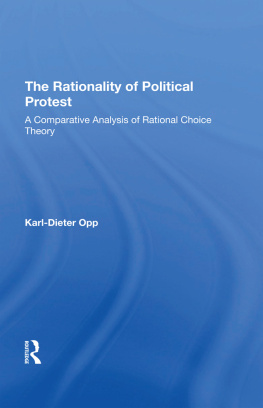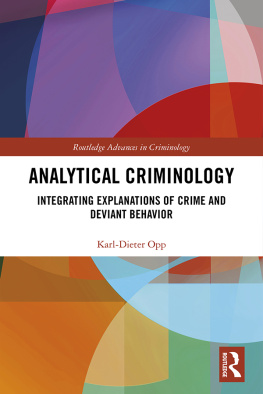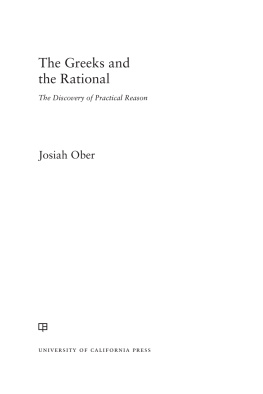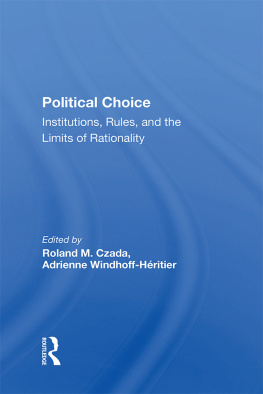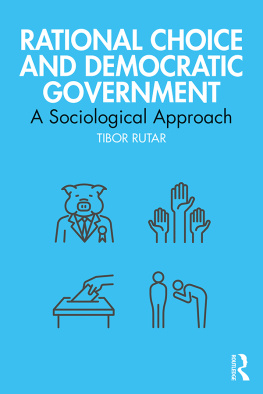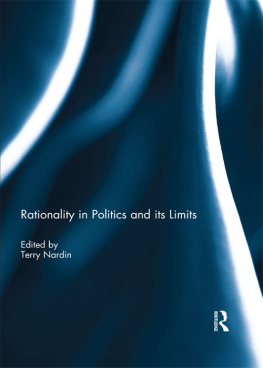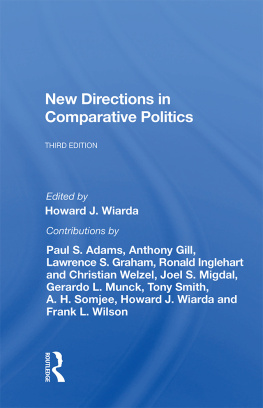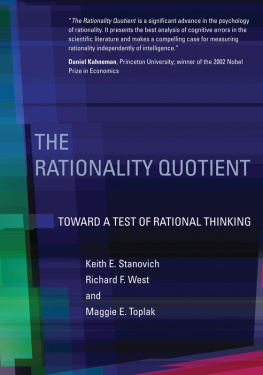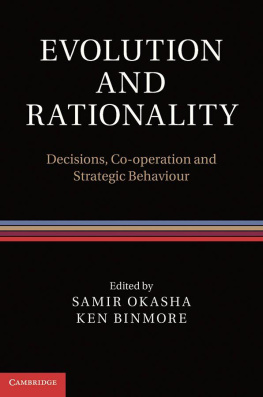The Rationality of Political Protest
NEW DIRECTIONS IN COMPARATIVE AND INTERNATIONAL POLITICS
Series Editors
Peter Merkl and Haruhiro Fukui
The Rationality of Political Protest, Karl-Dieter Opp
Pathways to Power: Selecting Rulers in Pluralist Democracies, edited by Mattei Dogan
New Politics in Western Europe: The Rise and Success of Green Parties and Alternative Lists, edited by Ferdinand Mller-Rommel
Comparing Pluralist Democracies: Strains on Legitimacy, edited by Mattei Dogan
No Farewell to Arms? Military Disengagement from Politics in Africa and Latin America, Claude E. Welch, Jr.
Comparing New Democracies: Transition and Consolidation in Mediterranean Europe and the Southern Cone, edited by Enrique Baloyra
The Rise and Fall of Italian Terrorism, Leonard Weinberg and William Lee Eubank
First published 1989 by Westview Press
Published 2019 by Routledge
52 Vanderbilt Avenue, New York, NY 10017
2 Park Square, Milton Park, Abingdon, Oxon OX14 4RN
Routledge is an imprint of the Taylor & Francis Group, an informa business
Copyright 1989 by Taylor & Francis
All rights reserved. No part of this book may be reprinted or reproduced or utilised in any form or by any electronic, mechanical, or other means, now known or hereafter invented, including photocopying and recording, or in any information storage or retrieval system, without permission in writing from the publishers.
Notice:
Product or corporate names may be trademarks or registered trademarks, and are used only for identification and explanation without intent to infringe.
A CIP catalog record for this book is available from the Library of Congress.
Library of Congress Cataloging in Publication Data
Opp, Karl-Dieter.
The rationality of political protest : a comparative analysis of
rational choice theory / Karl-Dieter Opp in
collaboration with Peter and Petra Hartmann.
p. cm. (New directions in comparative and international
politics)
Bibliography: p.
Includes index.
1. Opposition (Political science). 2. Government, Resistance to
3. Public goods. I. Hartmann, Peter. II. Hartmann, Petra.
III. Title. IV. Title: Political protest. V. Series.
JC328.3.067 1989
323.65dc20
89-9009
CIP
ISBN 13: 978-0-367-29542-4 (hbk)
Many of the basic ideas of the research reported in this book were developed in collaboration with Edward N. Muller (University of Arizona, Tucson), when Muller was a guest professor at the Institute of Sociology of the University of Hamburg, West Germany, during the Summer Semester, 1984. Previously we had each conducted research on determinants of political protest that included indicators of certain rational choice constructs, and we were interested in developing a more general specification of a rational choice theory of protest that could be tested with survey data. A research proposal for such a project was submitted to the Stiftung Volks-wagenwerk and was decided positively We are particularly grateful to the foundation for supporting this research.
We initially developed a rational choice model of illegal protest (rebellious collective action) and tested it across data from surveys conducted in West Germany (Hamburg and environs) and the United States (New York City). The result of this collaboration was an article published in the American Political Science Review (see Muller and Opp, 1986).
The theoretical framework developed in that article and the results of the empirical analyses seemed to be worth further elaboration. Due to prior commitments, Muller was unable to participate extensively in the phase of the project that has led to this book. During the course of several meetings we discussed each of the chapters intensively, however, and Mullers suggestions and critiques have led to the reformulation and clarification of many of the ideas presented herein. , in particular, draws on our American Political Science Review article, but at the same time expands upon it in various ways. Muller also edited each chapter after the initial draft of the manuscript had been completed.
Peter and Petra Hartmann were involved in the project as research assistants from its beginning in the fall of 1984. Petra Hartmann wrote . Wolfgang Roehl participated in the project for one year as a research assistant.
Peter and Petra Hartmann as well as Wolfgang Roehl read the entire manuscript and contributed to it by insightful suggestions.
Karl-Dieter Opp
1
Introduction
During the past twenty years political protest has become increasingly frequent in industrialized societies. At the same time the literature on social movements and political protest has grown rapidly too. Numerous empirical studies on various kinds of movements (e.g., peace, anti-nuclear, ecological), citizen action groups, and protest events have been conducted, on the micro as well as on the macro level.
In the 1970s the classical model for explaining these phenomena, which emphasizes individual motivational factors such as anomie, social isolation, status inconsistency rising expectations, and relative deprivation, came under attack, and a new group-oriented explanatory model, resource mobilization theory, became the dominant paradigm. This explanatory model in fact consists of several variants, and it also has been subject to criticism recently (see, e.g., Jenkins, 1983; Kerbo, 1982; McAdam, 1982).
Another theoretical approachthe theory of collective action, particularly represented by Olsons (1965) seminal workhas been applied by some (Salert, 1976; Silver, 1974; Tullock, 1971; 1974) to explain participation in social movements or protest groups. Although this theory can be related in certain ways to the resource mobilization approach, it also has been heavily criticized by some resource mobilization proponents (see particularly Fireman and Gamson, 1979). It may be regarded therefore as a distinct explanatory model.
In view of these different theoretical approaches the question arises: how can our understanding of the conditions for political protest be enhanced? Social scientists will, of course, provide quite different answers to this question depending on the theoretical and methodological orientation they advance. We will not argue here that one or the other strategy of achieving theoretical progress is superior. We will, however, explain our own strategy and argue that this is one possible way of (a) increasing our knowledge about the conditions for political protest (and political participation in general) and (b) integrating hypotheses of other theoretical approaches and empirical regularities found in empirical investigations. In what follows we will describe this strategy and, thus, the major focus of this book.
One possibility for gaining new insights into social phenomena is to apply a general social theory. One of the few general theories which has been applied already by the Scottish moral philosophers (particularly by Adam Smith and David Hume) and by many social scientists up to the present is the rational choice model, also called the economic model of man or utilitarian theory. It is the foundation of a whole branch of political science which is called Modern (or New) Political Economy or the Economic Theory of Politics. It is, furthermore, the background model of economics, and it has been applied by anthropologists, psychologists, and sociologists as well.

